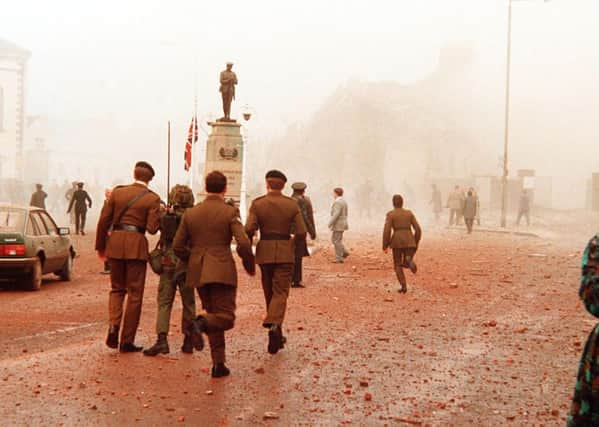PSNI explain why no officers on Poppy bomb probe


Eleven people were killed and more than 60 injured when an IRA bomb exploded near the town’s cenotaph on Remembrance Sunday in 1987.
Speaking in Westminster this week, Fermanagh and South Tyrone MP Tom Elliott told MPs that “there is not one police officer investigating that case”.
Advertisement
Hide AdAdvertisement
Hide AdHe told the News Letter afterwards: “Why are there no officers on the Enniskillen bomb case when it as one of the earlier cases in the Troubles and it had already been with Historical Enquiries Team (HET) for years?
“We were told repeatedly by HET that the report on it was almost complete, but it never saw the light of day. So why is it that LIB has not completed it after taking over from HETs several years ago?”
The PSNI have argued this week that LIB prioritises cases based on a Case Sequencing Model, but the News Letter asked if the fact that no officers have completed this report since LIB began underlines the credibility of the approach.
However Deputy Head of LIB Det Supt Jason Murphy said there was significant misunderstanding of the model.
Advertisement
Hide AdAdvertisement
Hide AdThe two key points that determine which cases are prioritised for investigation, he told the News Letter, are whether any of the suspects are still an active threat to the public and whether there are exhibits in the case which present a forensic opportunity.
LIB has recently selected six such cases to investigate, with ten officers working full-time on them, together with other support staff.
“The Case Sequencing Model seeks to identify those cases that present the best opportunity to bring offenders to justice and in doing so protect the public,” Mr Murphy said. “The Enniskillen Poppy Day Bombing has been the subject of several police investigations and reviews which have unfortunately not produced any further investigative opportunities at this time. We have met with the Enniskillen families and a number of representatives to explain the current absence of credible opportunities to progress the investigation, but we remain committed to bringing those responsible to justice, should opportunities arise in the future. We understand the frustration felt by all those affected by the bombing and have undertaken to complete a review and publish a report to the families in due course.”
However Aileen Quinton, whose mother died in the bombing, responded that she has “no faith whatsoever in the PSNI”.
Advertisement
Hide AdAdvertisement
Hide AdShe added: “Mr Murphy said he ‘remains committed to bringing those responsible to justice’. But how does this fit with the Chief Constable’s call for a debate on an amnesty in February,” she asked.
Ken Funston of victims group South East Fermanagh Foundation asked when the promised report would be published.
“When, in 20 years? This is lazy policing and pandering to republicans,” he said. “It is a lot simpler to refer to government documents and arrest old soldiers or police officers.”